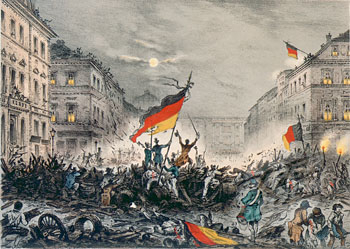
German 48ers Who Lived in Louisville, Kentucky
If you have any information about 48ers who lived in Louisville, Ky. to add to this site contact Joe Reinhart at: jrein8@yahoo.com
“Forty-eighters” were men who had participated in the German Revolution of 1848. These idealists had battled to establish a more democratic government in their homelands, unify Germany’s various states into one nation, and to bring about economic and social reforms. After the revolution failed these rebels had to flee their homelands to avoid prosecution and four to six thousand of them came to the United States. Louisville became home to a number of these men. Several of Louisville's Forty-eighters fought in the Union army during the American Civil War.
Hermann (German) Dettweiler, a dragoon in the army of the Grand Duke of Baden joined the revolutionary army in 1848 and had to flee Germany after the Battle of Waghaeusel. He spent time in France before coming to the United States. He joined the 6th Kentucky Volunteer Infantry Regiment U. S. in 1861 and attained the rank of captain. Dettweiler was wounded and discharged as disabled. He later served as constable in the city of Louisville. He is buried in Eastern Cemetery. (1825–1878)
Theodore Dietsch, a refugee from Saxony, edited the Louisville Anzeiger from 1854–1856. Dietsch had been a member of the Frankfurt Parliament in Germany and founded Die Reform in Evansville, Indiana, in 1853. He moved to Louisville in 1854. One source stated Die Reform failed because it was too radical.
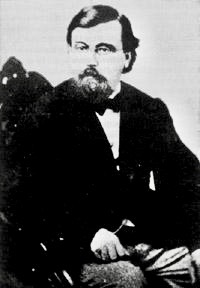
Bernhard Domschke, newspaperman, soldier, author, born in the Kingdom of Saxony. Domschke was an editor and revolutionist in Saxony before migrating to the U.S. in 1851. After doing newspaper work in New York, Boston, and Louisville (1853), he moved to Milwaukee (1854), where he became an ardent defender of liberalism and denounced slavery and the Democratic party. He fought in the 26th Wisconsin Infantry during the Civil War and was captured at the Battle of Gettysburg. First Lieutenant Domschke resigned his commission after Robert E. Lee his Rebel army surrendered in April 1865. He then became Editor-in Chief of the Milwaukee Herold. The 48er died in 1869.
Courtesy of Milwaukee County Historical Society
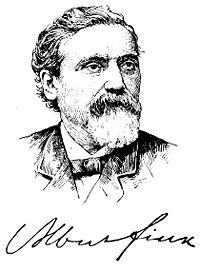
Albert Fink, engineer and inventor, was born in Lauterbach, Germany. Fink came to the U. S. in 1849. In 1857 he became construction engineer for the Louisville and Nashville Railroad.During the Civil War he was in charge of repairing the railroad property destroyed during the conflict. In 1869 he became vice president and general superintendent. In 1876 Fink was appointed commissioner of the Southern Railway and Steamship Association. He retired in 1889 and returned to Louisville. He invented a railroad truss the bore his name. (1827–1897)
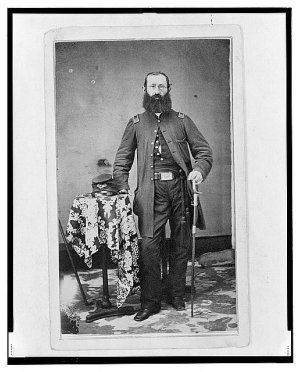
Dr. Charles Fischer, Library of Congress
Dr. Charles A. Fischer,
was born in or around 1820 in the Kingdom of Saxony. A physician, he mustered into the 32nd Indiana Infantry Regiment on February 16, 1862,
and was elected Chaplain. He resigned October 9, 1862 due to disability and returned to Louisville. He died on June 1, 1867 after suffering for years from dysentery contracted while in the army. Dr. Fischer was
not an ordained minister and served mostly as a surgeon. He was a freethinker and a
Turner. The doctor had come to the United States in 1850 after participating in the 1848 Revolution.
Karl Heinzen, a native of GrevenbroichNeusser Landkreis, Nordrheim-Westfalen, Germany, arrived in the United States early in 1848 and served as editor of the New York Schnellpost. He returned to Germany to participate in the Revolution, returning to the U. S. in 1850. The radical again served as editor of the Schnellpost; then moved to the Deutsche Zeitung and Janus in New York. Heinzen moved to Louisville in 1853 to edit the Herold des Westens. One of the publishers of the "Louisville Platform." This radical platform, among other things, called for the granting full civil rights to freed slaves and women, a minimum wage and maximum working hours, stricter separation of church and state, and an end to the death penalty. He next published the Pionier in Louisville, then in Cincinnati and finally moved it to Boston. (1809–1880)
Bernhard Hund, A native of Nussbach in Baden, operated a book and stationery store in Louisville, Ky., prior to joining the 6th Kentucky Volunteer Infantry Regiment, U.S. He served as captain of Company E until he resigned due to illness on Dec. 23, 1862. He previously commanded a Home Guard unit called the National Guards. Hund moved to Belleville, Illinois, after his discharge. In the U. S. he was a major agitator against slavery.
Dr. John Hupfauf, a native of Gunzburg, Bavaria, was educated as a doctor at the University of Tübingen and Munich. In 1837 he was named as Royal Bavarian Battalion Doctor for members of the Sanitary Commission for the Militia Battalion in Würzberg. He was warned that he was supposed to be arrested and left the country. He died in Louisville, Kentucky in October 1863 from Murine Typhus and is buried in Eastern Cemetery. His son Max Hupfauf was killed in May 1864 at the Battle of Pickett's Mill in Georgia.He was an officer in the 32nd Indiana Infantry Regiment.
Karl Resch, a jurist from Bad Dürkheim in the Rhineland-Palitinate, participated in the uprising in March 1849. Resch edited the Cincinnati Volksblatt from September 1850 until May 1851, and the LouisvilleAnzeiger from 1854–1856.
Friedrich A. Poschner, a native of Austria, had served as an artillery officer in the Prussian army before joining the revolutionists. When the Civil War broke out he joined the 9th Ohio Infantry Regiment and later became colonel of the 47th Ohio Infantry Regiment. In 1852 he was serving a a tutor to the Ward family in Louisville.
Jacob G. Ruckstuhl, a native of Klingenmünster in the Bavarian Rhineland, came to the United States in 1841and was naturlizated as a citizen in 1859. Ruckstuhl enlisted in Capt. Pennington’s company of cavalry in Humphrey Marshall’s regiment, and served with distinction in the War with Mexico. On the field of Buena Vista he saved his commander’s life and supposedly received seventeen wounds. Recovering as by a miracle, when the tocsin of the German Revolution of ‘48 was heard, Colonel Ruckstuhl returned to Europe to bravely battle for an unsuccessful cause, narrowly escaping the fate of hundreds of his countrymen, death or imprisonment. Returning to Louisville, he was for some time City Court interpreter and local reporter for the Anzeiger. When the late rebellion was in its inception he was a bold and manly opponent of the contemplated treason, and when the time came he entered the service as Captain in the Fourth Kentucky Volunteer Cavalry Regiment. He served with distinction and left the service a Lieutenant Colonel. He died in 1866. From the Louisville Daily Democrat, Sept 3, 1866.
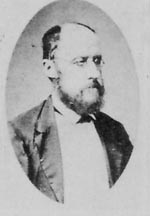
William Stängel, was born on April 27, 1826, at Schwäbisch Gmünd in the Kingdom of Württemberg. After studying law at the University of Tübingen Wilhelm entered state service in 1848. Because of his participation in the German Revolution of 1848 he fled from his homeland to avoid prosecution. He lived in New York and in Connecticut before moving to Louisville, Kentucky, where he became a naturalized citizen on May 13, 1854. Wilhelm worked as a journalist, drawing teacher and portrait painter in Louisville and was a founding member of the Louisville Turnverein, the second Turnverein organized in the United States. Wilhelm served first as a chaplain in the German 9th Ohio Infantry Regiment during the Civil War, then was promoted to captain of Company B. He moved to St. Louis, Missouri after the war and worked as a journalist for the Westliche Post newspaper. He died in St. Louis in 1880.
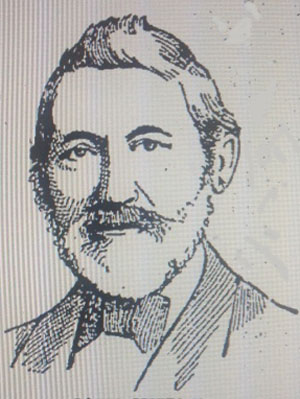
Ludwig (Louis) Franz Carl Eduard Stierlin, was born at Geldern in northwest Germany on February 27, 1816. The long-time editor of the Louisville Anzeiger fled
to Belgium in 1848 to escape the Prussian army and later immigrated to
the United States. Ludwig arrived in Louisville in 1851. He served as editor of several Louisville
German-American newspapers including the Louisville Anzeiger and the Beobachter am Ohio. Stierlin, who
had studied jurisprudence at the University of Bonn, was a strong advocate for
freedom and citizens rights. In 1848, after only four months as editor of the Westphalian Gazette in his native town in Germany, he had four charges of violating the press laws placed against him and he
soon sailed for America to avoid prosecution. He became the editor in chief of
the Louisville Anzeiger in February
1851 but left in August 1852. He returned to the Anzeiger in 1856 and served as manager and editor until 1870, when
he retired from management and concentrated on writing editorials. After his
wife Henrietta (nee Koppel) died on April 22,1889, he returned to Germany. Stierlin died on November 18th 1893 in Muenster, Germany. Ludwig's brother Henry Joseph Stierlin (1823–1903) was also a 48er and settled in St. Louis, Missouri. He achieved the rank of major in the 1st Missouri Cavalry (Union). For more information about Henry see https://www.facebook.com/missouricivilwarmuseum/photos/a.10150659805570214.698866.383892985213/10150659810150214/?type=3&theater
Wilhelm Vogt, born Hanau, helped found the Louisville Turnverein and
was a champion gymnast. Vogt was active in Revolutionary circles in
Frankfurt. When he was about to be arrested he decided to leave Germany.
He arrived in the United States in 1848. He worked as a jeweler and
taught gymnastics in a private school. During the American Civil War he
served for a time as a sutler for the 6th Kentucky Volunteer Infantry Regiment and also nursed wounded Union soldiers in Louisville. (1823–1871) He is buried in Cave Hill Cemetery. For further information on William Vogt see http://louisville48ers.yolasite.com/wiliam-vogt.php or click on William Vogt in the upper right hand corner of this page
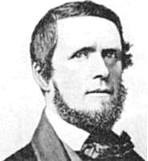
Wilhelm Weitling, a native of Magdeburg, Prussia, came to the United States in 1846, but returned to Germany to take part in the Revolution. He returned to the United States in 1850 and began the publication of a monthly journal, Die Republik der Arbeiter. Weitling was a Social reformer and labor leader. He died in New York. (1808–1871)
Ernst Ludwig Wittig, a native of Dresden, edited newspapers in Germany, including the Dresden Zeitung. Wittig fled to Switzerland in 1849 after an uprising in Dresden. He then moved to Paris, Belgium and England before immigrating to the United States in 1853. He returned to Europe in the spring of 1861. He edited the Louisville Anzeiger from September 1853 to August 1854. (1815–
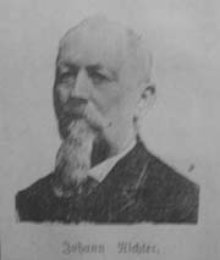
John Nichter, photo from Louisville Anzeiger, 1898
JOHN NICHTER, a native of the Grand Duchy of Baden was born on October 1, 1827. He immigrated to the United States from Germany in 1857. Nichter served in the 6th Kentucky Volunteer Infantry U.S. during the American Civil War with the rank of sergeant. He was injured on April 7, 1862, during the Battle of Shiloh and on October 10, 1862 was discharged for disability (loss of hearing). John Nichter died July 15, 1900, in Louisville, Ky, and is buried in St. Michael's Cemetery there.
We sat there together after the day’s trials and tribulations of life in cheerful conversation in a well known locale of our city, where one can still have old German comfortableness, where one is not forced to gulp down his glass of beer in all haste at the bar in order to make a place for the next person, but where you can sit in a corner in like-mined comfort, drink your glass of beer at a leisurely pace and can converse to your heart’s desire.
Our conversation turned to the events of 1848–1849, that tremendous period of Storm and Stress that intruded so deep in the history of the fatherland, and that drove over here in this land of freedom so many freedom fighters. We let those who played a role in those days pass before us, the living as well as the dead, whereupon each of us sought to stress the merits of his special countryman. One praised Carl Schurz, the other Hecker. There was in fact a German-Pole among us who raised his voice for Bankunin and Mieroskawsky, which was soundly voted down by us. We were in agreement that both were parasitic plants on the German tree of Freedom and damaged the fatherland’s cause more than they were useful.
Cause for our conversation was the contents of a notice in the newspaper that Oswald Dietz, who had played such a significant role in the revolutionary period as “Dictator of Nassau” in his homeland, had dies at the old people’s home of Cincinnati at the age of 75 years. We talked about this and that until we all finally got stuck. It concerned the question of which Baden regiment at the beginning of May 1849 was punished for its mutiny by being transferred for a short period of time to the Palatinate fortress of Landau?—“It was the 4th Baden Regiment, sirs— an old gentlemen called over from the next table, who had observed us up until now, but who had listened in silence. —“I was at that time a soldier in Landau and can remember quite clearly the unholy din those devils of a fellow often created in their camp in front of the city and as they sought to drum into us their revolutionary ideas.
—“Tell, Tell”—we called in chorus to the jovial old gentleman who had interrupted us in such a pleasant way, and who was none other than the well-known John Nichter of our city. Herr Nichter willingly accepted our invitation to take a place at our table, and at our request shared his experiences during that time with us as best he could. Our readers should not expect great acts of heroism. Not everyone could play a prominent role in such days. —however, the whole unpretentious story conveyed in the plain simple manner that is Mr. Nichter’s own, reflects again so truly the spirit of the time, that we want to try to repeat here as close as possible his exact words. —“I was born”—Mr. Nichter began after he lit a cigar and had a fresh glass of beer brought, —“at Dörmbach, royal land department of Bergzabern in the Pfalz and my occupation a confectioner. [”]—
“ On one Sunday in March 1848 I found myself with several comrades from my village in the neighboring Weissenburg in Alsace, when the news of Louis Phillippe’s abdication and the proclamation of the republic arrived. An ecstasy grasped citizens and soldiers. Total strangers hugged and kissed on the open street. The military—Lancers and Sapeurs d’ Afrique— fraternized with the people. The soldiers grabbed their officers by their arms and moved into the inn where they had to booze with them. The general state of madness also seized us. We bought cockades and colorful ribbons at a stall, attached them to the hats and we returned to the village in the evening, singing freedom songs. We were the first to spread the news, which gradually infected the whole Pfalz and then infected the rest of Germany. I have nothing special to report about the general events, only this observation: that the frenzy of 1848 passed by smoothly in contrast to that of 1849...
On the 16th of March of this year I was conscripted into the military and sent to the Fortress Landau —to the 4th battalion of the 9th Royal Infantry Regiment, which lay there in garrison, commanded by Colonel Wrede.
From Frankfurt, where at that time all went topsy-turvy, came to Landau where they pitched a camp outside the city, the two battalions of the 6th Baden Infantry Regiment, which had lain there in garrison, while the third battalion of that same regiment stayed in Speyer. The two battalions were terribly revolutionary and after the proclamation of the provisional government went over completely to the insurgents. This incited the citizens, who were restless anyway, that they stormed the arsenal, which was stopped with little trouble. I was on guard at the time and I remember we remained occupied until 10 o’clock at night.
This happened at the beginning of May. At this time as already stated, the previously mentioned rebellious 4th Baden Regiment advanced to Landau. It was believed that through this change it could be pacified and returned to obedience, but the result of this was that the troops in Landau began to mutiny. It came to serious excesses, namely in the English Garden, near the French Gates and in front of the Monastery Church, where I saw comrades throw ration bowls at the unpopular commander, while the commanding general Jetzt, who by the way was very popular, struck with his drawn sword among the troops in order to restore order.
The thing threatened to take a nasty turn—then—on 18 May, at 10 o’clock in the morning, General Jetzt assembled the entire garrison on the large square of Landau, where he gave a gripping speech. He said, a difficult testing time has started. He must leave it to our own discretion, whether we stay or wanted to return home; he could not hold us.
Most left, I was among them. We, forty men including eight from my village, moved out at the same time to the French Gates. Landau was so vacated by troops that officers had to stand guard like private soldiers until the Prussians relieved them. For the certainly little heroic act of releasing us, General Jetzt was later put into retirement, when Prince von Taxis also reoccupied the land with Bavarian troops after the Prussians had already seized it. That means he had done better than his collogue General Braun of Germersheim, who had two cannon and like-minded guard posts set up at each gate, with the threat to have everyone shot who wanted to leave the city.
When we arrived back home in Dörmbach the provisional mayor wanted to force us to drill the militia. Because we refused, he reported to the provisional commander at Bergzabern, who censured us. We received strong instructions to betake ourselves to neighboring Kapelle in order to instruct the volunteer corps. Whether we liked it or not we had to do this. Before we went, we wanted to again have some amicable days in the city. The drinks did not cost us much. The national guardsmen of Bergzabern were generous. From our inn we were able to witness how the national guard assembled in the market place under their commander the merchant Bursch and the commissar Bruch and with fife and drum marched off to Steinfeld 1 1/2 hours away, in order to take prisoner the mayor Kunz and the pastor Labe, under whose influence the community had remained royalists and had condemned the provisional government. The next morning they returned with quite frustrated faces and several of them had bloody heads. It was remarkable how subdued they were this morning compared to the racket that they had made on the previous evening. Also the music band led by Jacob Seebach had forgotten to play with their entry while they had played so enthusiastically upon their departure. We soon learned the cause of it. The citizens of Steinfeld of course instead of letting their mayor and pastor being taken away had made a sortie and the heroic national guard had their commander Bursch and their commissioner Bruch captured. It was now necessary to wash off this disgrace with blood. The ringleaders were very active. Among them were found Phillipp Pfister and the leather dealer Simon, the former a son and the latter a son-in-law of the postmaster Pfister, who was a student comrade of King Ludwig and participated in no way in the uprising. Other leaders were the butcher Schwarz, William Hörner, born in my village, and a school comrade of mine, who was a store servant with the merchant Bursch, Moritz, Hertle, et. Al. Two nights later they advanced anew toward Steinfeld, where they took up a position by a large brick structure outside the village and with pounding hearts awaited the things to come. Really soon a single man came from the village, who had a large white cloth tied around his head. It was the mayor Kunz who wanted to come out for a parley, in order to negotiate with the rebels. But the latter, of the opinion that it was a ghost, or at least the guardian spirit of the village, fired away, and Mr.Kunz returned with his business unfinished to Steinfeld...
The residents now were rather helpless, almost just as helpless as those from Bergzabern outside of the village. However, Steinfeld had its Joan of Arc. A young maiden by the name of Barbara Labe, niece of the pastor and sister-in-law of the mayor Kunz, hurried into the church, where she brought out from behind the altar a white flag and moved with it in front of the village. Shots were also fired on her, but the brave young woman did not let that disconcert her. The efforts of this female peace envoy brought about peace. Bursch and Bruch were released from captivity. The former however immediately betook himself to Switzerland. The other ringleader later betook himself somewhere else when the reaction came, I will later return to this affair. Concerning myself, I had several nice days in Kapelle. Our main obligation existing there was to drink good beer and to initiate the nearby war-minded militia in the secrets of handling a rifle. At the beginning of June we began to assemble by Landau. From Kaiserslautern and Kirchheim Bolanden Willich moved here with thousands of volunteers from of all areas of the Pfalz and the bordering lands. The Turners from Mainz, Hanau, and Frankfurt were especially represented in large numbers.
We camped a half and hour from Landau by Märzheim in Wiesenthal. Quite nearby in Oedesheim stood the Prussian advance post, Black Hussars with whom our Baden Dragoons had some skirmishes. Late in the evening the order came to retreat to Baden. We went by way of Billingheim, Steinweiler, Minfeld, Langenkandel, Bienenwald, and over the Werther Rhine Bridge into Baden. About the battles by Durlbach and Rastaat, in which I participated, I can pass over. Despite of all the bravery we were defeated by the Prussians everywhere because they had far-superior quality arms and leadership.
After the fights at Rastaat I had had enough. With some comrades from my village I took myself to Kehl and from there to Strasburg, where we were disarmed by the French authorities. They treated us very well and then we, in spite of the danger that threatened us, on the 4th of July went home to the 12 hour distant Dörmbach, they gave us each 5 Sous temporary military stopping place money. As soon as we had come over the Bavarian border, we had to choose hidden paths in order not to fall into the hands of the Prussians who still occupied the country. Arriving close to Dörrnbach, we sent a girl who we met by chance to my brother who came out and told us the Prussians were still in the village. He had us hide for three days in a rye field until they left. Two of my comrades were grabbed up by the military police and one had to sit 26 weeks and the other 39 weeks in the casemate of Landau. Generally there were strong punishments for the guilty. The son of the war minister, Count Fugger, who had been the lieutenant in the 2nd Artillery Regiment was shot in Landau. King Max wanted to pardon him but his own father stood steadfast in executing the sentence.
Two days later another aristocrat, Faust, was supposed to be shot. He had already been brought into the empty casemate Fuggers. However on the evening before the execution a fine carriage drove up and on the next morning Faust had disappeared together with the sentry. He is supposed to have protected a family near Rastaat from plundering and mistreatment by the side of the volunteers and the grateful master of the house had promised him his help for that when he was in need on his part. It went badly also for the leaders of the national guard from Bergzabern, the heroes of the Steinfeld affair. The commander Bursch who—as already noted, had a foreboding of evil immigrated immediately to Switzerland. The rest were taken prisoner and sentenced to 10–15 years in prison by the court of Assizes in Zweibrücken. The leather dealer Simon received 16 years in prison and William Hörner from my village who had been the shop servant with the merchant Bursch was sentenced to death. He succeeded in escaping in an amazing way and fled to Dörrnbach, where we hid him in our house, while the military police kept watch on his parents’ house for a long time, until after the amnesty in August. Before that two friends and I had already lead the unfortunate one over the mountain path to the French border. It had just hit midnight when we had arrived with him at Weissenburg.
When the amnesty was issued on the 7th of August I went from Landau to Kaiserslautern in the newly formed punishment battalion for six weeks. From there I went for a short time to Oedesheim and then on Christmas Day 1849 to Würzburg. In all I still had 5 1/2 years to serve after my arrest. On 16th March 1855 I was discharged. On 16 January 1857 I got my wife from the neighboring Billingheim and on the 17th January traveled to America, where I arrived on April 1. - - - -
It was already rather late when we left the place. Later we had the opportunity to examine the military papers of John Nichter, as a result, that he after his reentry into the military had very good conduct and was discharged with all honor.
We permitted ourselves to produce a striking picture for his numerous friends and acquaintances, and wish the gallant old man, who in spite of his 71 years is bodily and mentally still very vigorous, that he may still spend many agreeable years in our midst.
Forty-Eighters started the Turnverein Movement in the United States. The Turnverein in Louisville. Kentucky was the second one founded in the United States (1850). Members were called Turners. For more information see http://www.americanturners.com/Sites/turners/docs/TurnvereinMovementTexas.pdf
See The Forty-Eighters: Political Refugees of the German Revolution of 1848, E. A Zucker, editor. (New York: Columbia University Press, 1950). It contains capsule biographies of mant Forty-Eighters.
See listing of Members of the Louisville Turnverein Turners 1850–1857 http://louisville48ers.yolasite.com/louisville-turners.php or click on Louisville Turners in upper right hand corner of this page
For a Power point Presentation ogf the Revolutions of 1848 go to http://www.powershow.com/view4/41fac2-ODFlZ/The_Revolutions_of_1848_powerpoint_ppt_presentation